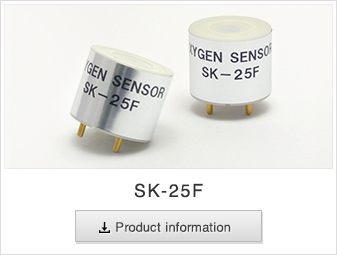
Applications
- Safety - Oxygen detectors
- Measurement - Oxygen monitors
- Oxygen incubators
- Food industry - Refrigeration, greenhouses
Features
- Virtually no influence from CO2
- Temperature compensation circuit included
- No position dependency
- Stable output signal
- No warm-up time is required
- No external power supply required for sensor operation
Features
Figaro Engineering Inc. is pleased to announce its latest offering--a compact galvanic cell type oxygen sensor, SK-25, with popular pin configurations for industrial gas sensor applications.
The most notable features of SK-25F are no influence from CO2, good linearity up to 30% oxygen, and excellent chemical durability. These features make the sensor ideal for oxygen monitoring in various applications such as the biochemical field, food industry, and safety applications.
In comparison to our conventional KE-series oxygen sensors, the new oxygen sensor has no position dependency by virtue of its unique internal structure, enabling usage in portable applications.
In general, there are two types of galvanic cell oxygen sensors:
- - Partial Pressure Control type using solid polymer membrane for gas diffusion (such as SK-25F)
- - Mass Flow Control type using a capillary for gas diffusion
The Partial Pressure Control type shows an excellent linear relationship between oxygen concentration and sensor output. One advantage of using this sensor is the ability of users to perform simple and accurate two-point calibration (e.g. 0% oxygen and oxygen at certain concentration). A common perception of the Partial Pressure Control type sensor is that it has larger temperature dependency and slower response speed than the Mass Control type. However, by embedding a temperature compensation circuit inside the sensor, the sensor output of SK-25F has a smaller temperature dependency than the Mass Flow Control type. In addition, due to its unique gas diffusion electrode technology, SK-25F has quicker response speed than the Mass Flow Control type.
Since a voltage conversion circuit is included in the sensor, warm-up time is not required after mounting on a PCB. Customers can measure oxygen concentration quickly after mounting on PCB.
To minimize consumption of the sensor life during storage, the gas diffusion holes are covered by blue tape when the sensor is shipped. Measurement can be performed quickly after removal of the blue tape.
Frequently Asked Questions
- Question: Can the sensor be used for higher than 30% O2?
-
Answer: Unfortunately no. Please do not expose O2 concentration higher than 30%.
Otherwise, the sensor may be damaged irreversibly.
For higher concentration detection, KE series oxygen sensors are recommended.
Specifications
| Item | Model | |
|---|---|---|
| SK-25F | ||
| Measurement range | 0~30% O2 | |
| Accuracy (Note 1) | ±1% full scale | |
| Operating conditions | Atmospheric pressure | 1013hPa ± 20% |
| Temperature | -10˚~50˚C | |
| Relative humidity | 0~99%RH (no condensation) |
|
| Response time (90%) (Note 2) | ≤ 15 seconds | |
| Initial output voltage under factory test conditions | 5.5~8.5mV | |
| Factory test conditions |
Atmospheric pressure | 1013 ± 5hPa |
| Temperature | 20˚±1˚C | |
| Relative humidity | 60±5%RH | |
| Life expectancy at 20˚C in normal air (Note 3) | approx. 3 years | |
- 1) When calibrated at both 0% and 30% of O2, accuracy in the range from 0-30% O2 shall be within ±1% full scale.
- 2) Sensors should be used under conditions where the air exchange is greater than 200~300ml/minute in order to obtain the response speed as specified in Table 1.
- 3) Life expectancy at 20˚C in normal air is defined as the period until sensor output drops to 60% of original value.


 SK-25F
SK-25F


